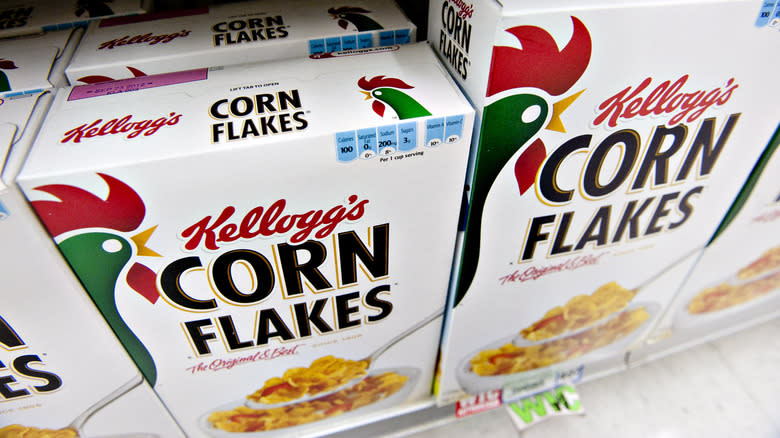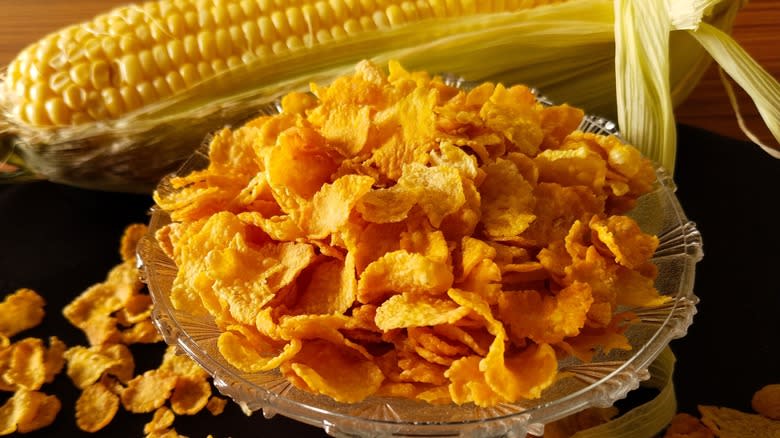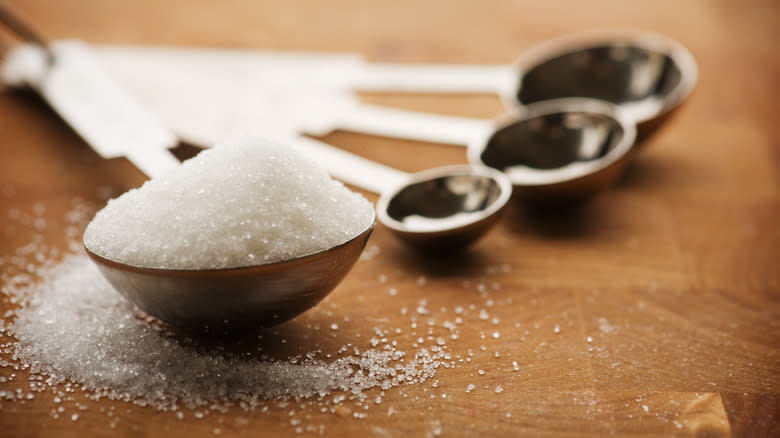The Bizarre, Accidental Origins Of Kellogg's Corn Flakes

- Oops!Something went wrong.Please try again later.
- Oops!Something went wrong.Please try again later.
The most exciting part of the grocery store is unquestionably the cereal section. When you take a turn down the aisle, you'll immediately be besieged by an astounding array of colors and cartoons. These striking visuals are rivaled only by the fun, flavorful foods in the various boxes.
However, not all breakfast cereals are created equal. Some of the oldest cereals still on shelves remind us of a time when breakfast bowls weren't quite as bombastic as they are today. Cereals like Kellogg's Corn Flakes are some of the few remaining callbacks to this era. In fact, Corn Flakes were created as an intentionally bland breakfast option. They were invented at the tail end of the 1800s by John Harvey Kellogg, his wife Ella Ervilla Eaton, and his brother William Keith Kellogg. John Harvey Kellogg was the director of a health resort in Michigan, and a deeply religious man who believed that the modern (at the time) diet was responsible for all manner of sin -- literally. He felt that flavorful foods led folks into other forms of temptation, and his commitment to spreading the gospel of a dull diet played a part in setting the family on the path that led to the creation of Corn Flakes.
Read more: 14 Of The Oldest Cereals Still On Shelves
Dr. Kellogg And Health Reform

There are several theories about Corn Flakes and the cereal's invention, many of which have a certain degree of truth to them. John Harvey Kellogg's religious beliefs did lead him to follow a plain diet, and he did advise others that consuming food free of flavor kept both the body and mind free from sexual desire. However, he never specifically referenced starting your morning with a bowl of Corn Flakes as a method of avoiding temptation. By most accounts, Corn Flakes were mainly created as a counter to indigestion, which was a common concern of the time.
Kellogg was not the first person to suggest that diet could play a part in living a life free of "sinful" behaviors. The invention of the graham cracker and the snack's creator, Presbyterian minister Sylvester Graham, are at the forefront of this theological movement. It's not clear whether Kellogg was familiar with the minister's work, but knowingly or not, he was certainly taking a page from Graham's book when he fed his guests at the sanitarium -- and eventually invented the cereal there.
Corn Flakes Through The Years

The first food that could be called cereal pre-dated John Harvey Kellogg's creation: It was made in 1863 by James Caleb Jackson, who was also in the health resort business. He called it granula, and served it to his patients. However, it was Kellogg who invented the first flake cereal, which is a form that many cereals, including Corn Flakes, are available in today. Kellogg was not inclined toward the business side of things, and only wanted to improve the digestive health of the average American.
Kellogg's Corn Flakes eventually caused a dramatic disagreement between John and his brother William, and as you might imagine, this spat centered around sugar. Though John never wavered in his stance on adding sugar to Corn Flakes, William disagreed. William went on to found the Kellogg Company, and the sugar he added to Corn Flakes sparked the success of the cereal. Just a few decades later, in the 1940s, all cereals had sizable sugar content. The invention and evolution of Kellogg's Corn Flakes helps explain why you're slurping down a bowl of sugary cereal in the morning.
Read the original article on Daily Meal.

